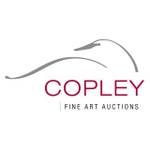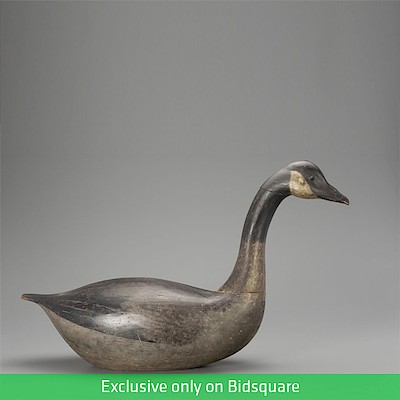Canvasback Drake, Lee Dudley (1860-1942)
Lot 66
About Seller
Copley Fine Art Auctions
20 Winter Street
Pembroke, MA 02359
United States
Founded in 2005, Copley Fine Art Auctions is a boutique auction house specializing in antique decoys and American, sporting, and wildlife paintings. Over the course of the last two decades, the firm has set auction records for not only individual decoy makers, but also entire carving regions. Copley...Read more
Estimate:
$30,000 - $50,000
Absentee vs Live bid
Two ways to bid:
- Leave a max absentee bid and the platform will bid on your behalf up to your maximum bid during the live auction.
- Bid live during the auction and your bids will be submitted real-time to the auctioneer.
Bid Increments
| Price | Bid Increment |
|---|---|
| $0 | $50 |
| $1,000 | $100 |
| $2,500 | $250 |
| $5,000 | $500 |
| $10,000 | $1,000 |
| $25,000 | $2,500 |
| $50,000 | $5,000 |
About Auction
By Copley Fine Art Auctions
Jul 19, 2018
Set Reminder
2018-07-19 13:00:00
2018-07-19 13:00:00
America/New_York
Bidsquare
Bidsquare : The Sporting Sale 2018, Day 1
https://www.bidsquare.com/auctions/copley/the-sporting-sale-2018-day-1-3286
On July 19, Copley Fine Art Auctions will lead off their annual Sporting Sale with 140 lots from the Donal C. O’Brien, Jr. Collection of Important American Sporting Art and Decoys. On July 20 Copley will present an additional 425 lots of decoys, fish carvings, and sporting art. Copley Fine Art Auctions cinnie@copleyart.com
On July 19, Copley Fine Art Auctions will lead off their annual Sporting Sale with 140 lots from the Donal C. O’Brien, Jr. Collection of Important American Sporting Art and Decoys. On July 20 Copley will present an additional 425 lots of decoys, fish carvings, and sporting art. Copley Fine Art Auctions cinnie@copleyart.com
- Lot Description
Canvasback Drake
Lee Dudley (1860-1942)
Knotts Island, NC, c. 1890
13 1/2 in. long
Dudley decoys have been held in the highest regard since the earliest days of decoy collecting. In fact, two seminal books on decoy collecting, William J. Mackey, Jr.’s "American Bird Decoys" and Joel Barber’s "Wild Fowl Decoys," both begin their first chapter with stories of Dudley decoys and the authors' reverence for them. Barber's particular love of Dudleys is illustrated in the initial three plates of his book; the first of which depicts two Dudley decoys prominently displayed top and center on a collection wall. In 1981, a panel of experts reviewing the decoy collection at the Shelburne Museum declared a Dudley decoy of Barber's to be the best of the collection.
This decoy is one of the finest examples of a Dudley canvasback ever to be offered at auction. It is believed to have been made for use at the Dudley’s Island Club, which was owned by Lee’s twin brother, Leonard V. Dudley (1860-1932). The underside of the bird retains the original weight and a faint brand that appears to be “F R.," possibly for Frank Reese from Currituck, North Carolina. The body is long and graceful and the raised wing tips are carved in a sharp V-shape. This bird has sophisticated head carving with a refined bill, pronounced crown, and full cheeks. William J. Mackey, Jr. was so impressed with Dudley's work that he proclaimed “the heads on Dudley’s decoys are the finest the writer has ever seen.”
This rare example carries excellent provenance and is in very good condition by Dudley and regional standards. These two points cannot be overstated when considering Dudley decoys. The provenance leads directly from the Mackey Collection, to the Megargee Collection, to the O’Brien Collection. Additionally, it was illustrated in the July/August 1988 issue of "Decoy Magazine" for winning ‘Best in Show’ among other awards at the Mid-Atlantic Wildfowl Festival in Virginia Beach. Joe French illustrated this exact decoy in the Megargee Collection as part of his "Decoy Magazine" series “Early Decoy Days.”
Though it is likely that Lee Dudley made hundreds of birds over the course of his career, very few of his decoys survived. Their popularity among collectors has led to numerous contemporary copies, and re-headed or re-bodied examples.
The Dudley decoy has always been known for its bold, singular form and this carving exemplifies all of the desirable attributes one looks for. To draw from Gene and Linda Kangas’ "Decoys: A North American Survey:" "A visual study of the complete Dudley bird form, whatever the species, reveals an uninterrupted flow from bill tip to tail’s end. The successful manner in which the bill fits into the lower cheeks, the cut of the neck-base, sweeping powerful chest, and smooth, curved body combine into one of the finer sculptural solutions in the decoy world.
Finding Dudley decoys with their original head and bill, as seen on this canvasback, is extremely difficult. The form, execution, rarity, condition, and provenance of this canvasback place it among the finest North Carolina decoys to ever be offered for sale at auction.
Mix of original and working paint with heavy gunning wear and reset head and neck with age lines.
Provenance: William J. Mackey, Jr. Collection
Megargee Collection, acquired from the above in the early 1960s
Donal C. O'Brien, Jr. Collection
Literature: Joe French, “Early Decoy Days: Traveling Man,” Decoy Magazine, Lewes, DE, March/April 2005, p. 25, exact decoy illustrated.
William J. Mackey, Jr., “American Bird Decoys.” New York, 1965, pp. 168-170.
Joel Barber, "Wild Fowl Decoys," New York, NY, 1954, pp. 1-5, pl. 1-3, related decoys illustrated.
Dick McIntyre, “The Dudley Decoy,” Decoy Magazine, Burtonsville, MD, March/April 1994, cover story, pp. 8-14.
Henry A. Fleckenstein, Jr., "Southern Decoys of Virginia and the Carolinas," Exton, PA, 1983, pp. 215-219.
Gene and Linda Kangas, “Decoys: A North American Survey,” Spanish Fork, UT, 1983, pp. 3-4.
Copley Fine Art Auctions, "The Sporting Sale 2011," Plymouth, MA, July 2011, lot 629, exact decoy illustrated.
Joe Engers, ed., “’Old Decoys’ Compete for Ribbons,” Decoy Magazine, Ocean City, MD, July/August 1988, p. 29, exact decoy illustrated.Condition report requests can be made via email or by telephone (info@copleyart.com or 617.536.0030). Any condition statement given is a courtesy to customers, Copley will not be held responsible for any errors or omissions. The absence of a condition statement does not imply that the lot is in perfect condition.Condition
- Shipping Info
-
Shipping info
Copley Fine Art Auctions does not handle the shipping of any items. Shipping is the sole responsibility of the buyer. Once your payment has cleared, and we have received your authorized shipping release form items may be released for shipment. Copley Fine Art Auctions, LLC shall have no liability for any loss or damage to such items. Buyers should allow up to four weeks for shipment.PLEASE BE AWARE THAT INTERNET BIDDERS MAY NOT PICK UP THEIR ITEMS AT THE SALE SITE. ITEMS CAN BE PICKED UP BY APPOINTMENT OR SHIPPED STARTING FIVE DAYS AFTER THE CONCLUSION OF THE SALE
-
- Buyer's Premium



 EUR
EUR CAD
CAD AUD
AUD GBP
GBP MXN
MXN HKD
HKD CNY
CNY MYR
MYR SEK
SEK SGD
SGD CHF
CHF THB
THB














